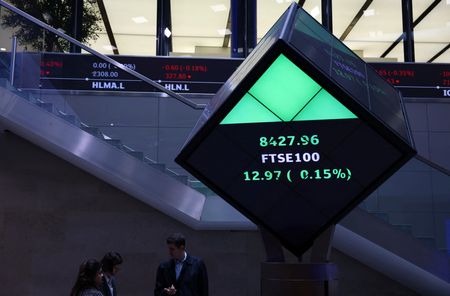By Sanchayaita Roy, Ragini Mathur and Twesha Dikshit
(Reuters) – British stocks ended higher on Thursday after stronger domestic GDP data, while investors assessed mixed corporate earnings.
The blue-chip FTSE 100 rose 0.6%, while the domestically focused FTSE 250 gained 0.1%.
Britain’s economy grew more strongly than expected in the first quarter of 2025, providing a boost to the government and finance minister Rachel Reeves, who faces challenges ahead due to her tax hike on businesses and the impact of U.S. President Donald Trump’s trade wars.
“The better-than-expected GDP growth has provided a positive signal to markets, but the reaction remains cautious due to underlying economic uncertainties and external risks,” Daniela Sabin Hathorn, senior market analyst at Capital.com, said.
“The stronger GDP growth may influence the Bank of England’s approach to interest rates. While the Bank recently reduced rates … the robust Q1 performance could lead policymakers to adopt a more cautious stance on further rate cuts.”
Last week, the Bank of England’s surprisingly hawkish stance slashed June rate cut expectations, with markets now anticipating quarterly rather than consecutive cuts.
Hikma Pharmaceuticals gained 7.4%, the most among FTSE 100 stocks, after the British drugmaker introduced a five-year revenue target of 5 billion pounds ($6.64 billion) in 2030.
National Grid shares climbed 3% after the renewable energy firm exceeded annual profit estimates.
Sports retailer JD Sports gained 1.4% after reports of American retailer Dick’s Sporting Goods nearing a deal to buy rival Footlocker.
Keeping gains at check, the energy index fell 2.1%, tracking lower oil prices on expectations of a US-Iran nuclear deal. [O/R]
Sage fell 3.8% and was among the top losers in the blue chip index, after the software company’s North America revenue growth slowed.
Across the Atlantic, U.S. Federal Reserve chair Jerome Powell said central bank officials felt they needed to reconsider the key elements around jobs as well as inflation in their current monetary policy approach.
(Reporting by Sanchayaita Roy, Ragini Mathur and Twesha Dikshit in Bengaluru, Additional reporting by Rashika Singh; Editing by Tasim Zahid and Andrew Heavens)










